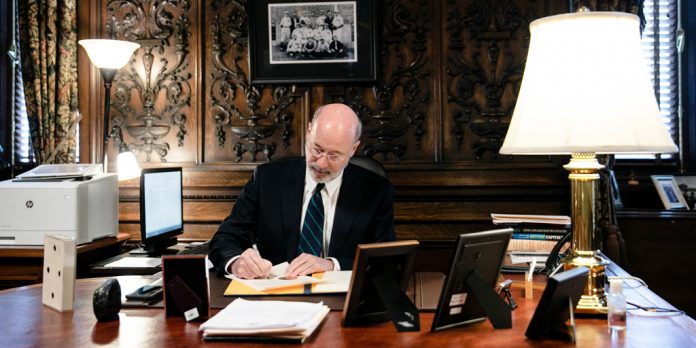Gov. Tom Wolf vetoed House Bill 2025, which would have prevented the Pennsylvania Department of Environmental Protection from taking any action to abate, control or limit carbon dioxide emissions in the commonwealth without the prior approval of the General Assembly.
Carbon dioxide is a harmful greenhouse gas and a major contributor to climate change, and, said Wolf, this bill would have put a halt to DEP efforts to mitigate the impact climate change has on lives and livelihoods in Pennsylvania, including rulemaking currently being developed to allow Pennsylvania to join the Regional Greenhouse Gas Initiative. RGGI is an economically-sound program that has a proven record of reducing greenhouse gas emissions in member states.
Higher temperatures, unseasonal changes in precipitation and more frequent and extreme storms – all adverse effects of climate change – have already been experienced in Pennsylvania, and Wolf said we must take action now to prevent worse changes from further endangering Pennsylvanians. He added that the bill “ignores science, and would have hampered the ability of the DEP to protect Pennsylvanians.”
“Addressing the global climate crisis is one of the most important and critical challenges we face. This legislation is extremely harmful to public health and welfare as it prevents the Pennsylvania Department of Environmental Protection from taking any measure or action to abate, control or limit carbon dioxide emissions, a greenhouse gas and major contributor to climate change impacts, without prior approval of the General Assembly.
“Like every state in the country, the commonwealth has already begun to experience adverse impacts from climate change, such as higher temperatures, changes in precipitation, and frequent extreme weather events, including large storms, flooding, heat waves, heavier snowfalls and periods of drought. Reductions in carbon dioxide emissions are even more significant now as emerging evidence links chronic exposure to air pollution with higher rates of morbidity and mortality from COVID-19.
“This legislation also prohibits the commonwealth from participating in the Regional Greenhouse Gas Initiative, a regional initiative among Northeast and Mid-Atlantic states to reduce greenhouse gas emissions while generating economic growth, unless additional legislation is enacted. RGGI participating states have reduced power sector carbon dioxide pollution by 45 percent since 2005, while the region’s per-capita gross domestic product has continued to grow. By joining RGGI, Pennsylvania has the opportunity to make real progress on limiting climate change-causing carbon pollution while generating thousands of new jobs, providing for worker training, and offering future electric bill savings.
“In addition to the legislation’s failure to address climate change, the immediate effect of this legislation would be to halt a rulemaking package I directed the Department to develop by executive order pursuant to the authority of the Air Pollution Control Act to abate, control, or limit carbon dioxide emissions from fossil-fuel-fired electric power generations. The Regulatory Review Act and the Air Pollution Control Act afford the opportunity for extensive public participation, including public comment and public hearings, in the rulemaking process. Members of the General Assembly also have a robust role in the rulemaking process, including through their appointments on advisory committees and the Environmental Quality Board. This legislation creates burdensome and duplicative processes that will thwart the Department’s ability to take any action to regulate the greenhouse gas most responsible for climate change in the transportation, industrial and commercial sectors, as well as the electric power sector.
“The citizens of this commonwealth cannot afford to wait any longer. Given the urgency of the climate crisis facing Pennsylvania, the commonwealth must take concrete, economically sound, and immediate steps to reduce greenhouse gas emissions. Allowing this legislation to become law would effectively deny that climate change is an urgent problem that demands prudent solutions.”


